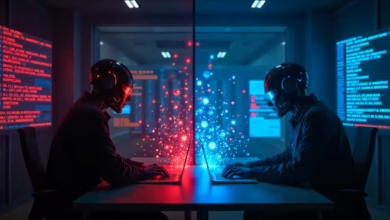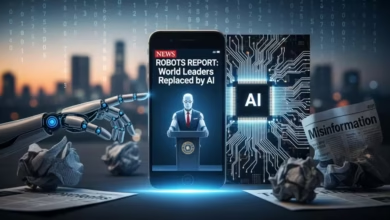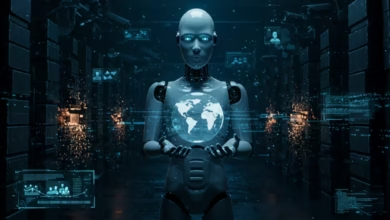Deepfakes and Politics: The Threat to Democracy

The blog post Deepfakes and Politics: The Threat to Democracy explores the profound implications of deepfakes and politics on contemporary democratic systems. It begins with an overview of how deepfake technology creates convincing misinformation, influencing political narratives. The article examines the role of AI in shaping modern political campaigns, highlighting the ease with which misleading content can spread. It presents the risks associated with digital propaganda, stressing the potential to undermine public trust and the integrity of elections. Finally, the post emphasizes the need for proactive measures to mitigate threats posed by deepfakes, suggesting strategies for policymakers and tech companies to safeguard democracy. Overall, the discussion underscores why addressing deepfakes and politics is crucial for protecting democratic values.
Understanding The Impact Of Deepfakes On Politics

Deepfakes pose a significant threat to the integrity of political discourse, with their potential to distort reality and manipulate public opinion. As synthetic media technology advances, the boundaries of what is real and fake blur, complicating efforts to inform and engage the electorate. The implications of deepfakes and politics extend beyond misinformation; they challenge the fundamental principles of democracy by creating a landscape where digital propaganda can easily sway public sentiments and alter perceptions of candidates and policies.
Key Concerns Regarding Deepfakes:
- Decreased trust in media sources
- Manipulation of public perceptions about political figures
- Spread of misinformation during elections
- Potential for foreign interference in domestic politics
- Undermining of political debates and discussions
- Difficulty in identifying the truth
As political campaigns increasingly leverage digital platforms, the use of deepfakes can result in serious reputational damage to candidates and political institutions. The rapidly evolving nature of this technology requires vigilance and proactive measures to mitigate its effects. Adopting robust fact-checking mechanisms and fostering media literacy among the public are essential steps in combating the challenges posed by deepfakes and ensuring the health of democratic processes.
How AI Misinformation Shapes Modern Political Campaigns

As the digital landscape evolves, deepfakes and politics have become a volatile mix that threatens the integrity of democratic processes. With the rise of sophisticated AI-generated content, the lines between reality and manipulation are increasingly blurred. Political campaigns are now engaging in video manipulation to create misleading representations of opponents or critical issues, ultimately seeking to sway public opinion. This growing concern has motivated stakeholders to scrutinize the implications of such technologies on political discourse and voter trust.
Impact of Deepfakes on Political Campaigns
| Type of Misinformation | Potential Impact | Example of Use |
|---|---|---|
| Deepfake Videos | Altered perception of candidates | Fake endorsements or statements |
| Altered Audio | Misrepresentation of policies | AI-generated speeches |
| Social Media Posts | Viral spread of falsehoods | Manipulated quotes |
| News Articles Using AI | Erosion of trust in media | Fake news stories |
With the advent of powerful machine learning algorithms, the techniques for video manipulation have become increasingly sophisticated.
Techniques For Video Manipulation
The integration of deep learning techniques allows for the creation of hyper-realistic videos that can convincingly depict individuals saying or doing things they never did. This technology is often used in a context that distorts facts and perpetuates narratives that are politically beneficial to certain entities. The implications are significant; once a manipulated video goes viral, it can lead to real-world consequences, shaping public perceptions and possibly influencing election outcomes.
Consequences Of Misinformation
The consequences of AI-generated content and video manipulation extend far beyond immediate political gains. Misinformation can erode public trust in institutions and challenge the fundamental principles of democracy. As society grapples with realities shaped by biased narratives, voters may become disillusioned, resulting in lower civic engagement and participation in the democratic process. Furthermore, the emergence of such technologies poses a danger to informed decision-making among constituents.
Steps To Identify AI-Generated Content:
- Examine the source of the content for credibility.
- Notice any unusual visual or audio discrepancies.
- Look for context surrounding the content to ascertain its authenticity.
- Check for corroborating reports from reliable news sources.
- Use reverse image or video search tools to locate original sources.
- Analyze the overall quality of the content—deepfakes may lack consistency.
- Educate others about potential biases in media to encourage critical thinking.
As we move forward in an era defined by advanced technologies, understanding the risks associated with deepfakes and politics becomes paramount. Addressing the challenges posed by video manipulation and AI-driven misinformation is essential for safeguarding democracy and sustaining informed public discussion.
Navigating The Risks Of Digital Propaganda In Democracy

In today’s political landscape, the emergence of deepfakes and politics has introduced significant risks to democratic processes. These sophisticated AI-generated videos can cast doubt on the authenticity of political messages, leading to increased AI misinformation that manipulates public perception. The implications are profound, as voters may find it challenging to discern fact from fiction, causing polarization and mistrust among citizens.
Precautions Against Digital Propaganda:
- Educate the public about the existence and risks of deepfakes.
- Encourage the development of tools for detecting AI misinformation.
- Promote critical thinking skills in media consumption.
- Support policies that regulate the use of deepfake technology in political messaging.
- Collaborate with social media platforms to enhance fact-checking processes.
- Advocate for transparency in political advertisements.
As deepfakes and politics continue to evolve, it is crucial for both individuals and institutions to recognize the challenges posed by this technology. The spread of AI misinformation through digital channels threatens not only the integrity of elections but also the very fabric of democratic discourse. Therefore, a collective and informed response is essential to mitigate these risks and preserve the foundations of democracy.
Taking Action Against Deepfakes To Safeguard Democracy

The emergence of deepfakes and politics poses a significant threat to democratic processes worldwide. These AI-generated manipulations not only distort the truth but also contribute to pervasive AI misinformation that can influence public opinion and undermine trust in political institutions. As synthetic media continues to advance, it becomes imperative for stakeholders—ranging from policymakers to technology companies—to take decisive action to mitigate these risks and safeguard the foundations of democracy.
Steps To Combat AI Misleading Content:
- Enhance digital literacy programs to educate the public about deepfakes and synthetic media.
- Implement stricter regulations on the creation and distribution of misleading AI-generated content.
- Encourage collaboration between technology companies to develop effective detection tools for identifying deepfakes.
- Promote transparency in the use of AI technologies in political campaigns.
- Foster research initiatives focused on understanding the implications of deepfakes in societal contexts.
- Engage social media platforms in actively monitoring and flagging potentially harmful deepfake content.
- Support independent fact-checking organizations that can scrutinize and debunk AI misinformation.
By adopting these measures, society can uphold democratic integrity in an era increasingly plagued by digital manipulation. It is crucial for citizens, tech leaders, and governments to unite against the deceptive capabilities of synthetic media, fostering an environment where truth prevails over misinformation. The future of democracy hinges on our collective ability to recognize and combat the challenges posed by deepfakes and AI misinformation.
Brifing Document: Deepfakes and Politics / The Threat to Democracy
This brief examines the significant challenges that deepfake technology poses to contemporary democratic systems. It highlights how AI-generated content can generate persuasive misinformation, manipulate public opinion, and undermine the integrity of elections and political discourse. The article emphasizes the urgent need for proactive measures by policymakers, technology companies, and individuals to protect democratic values from the spread of digital propaganda.
Main Themes and Key Ideas:
1. Deepfakes as a Threat to Democratic Integrity
Deepfakes are identified as a “significant threat to the integrity of political discourse.” The technology blurs the lines between reality and fabrication, making it difficult for the public to discern truth from falsehood. This directly impacts the electorate’s ability to be informed and engaged, as “digital propaganda can easily sway public sentiments and alter perceptions of candidates and policies.”
Key Concerns:
- Decreased trust in media sources: The proliferation of deepfakes erodes confidence in traditional news outlets and information channels.
- Manipulation of public perceptions: Deepfakes can create false narratives around political figures, damaging reputations or creating misleading endorsements.
- Spread of misinformation during elections: This is a critical risk, as manipulated content can directly influence voter behavior and election outcomes.
- Potential for foreign interference: Deepfakes offer a powerful tool for external actors to disrupt domestic politics.
- Undermining of political debates and discussions: When facts are indiscernible, meaningful dialogue becomes impossible.
- Difficulty in identifying the truth: This is a overarching challenge that affects all aspects of democratic participation.
2. AI Misinformation’s Impact on Modern Political Campaigns
The article highlights how “deepfakes and politics have become a volatile mix that threatens the integrity of democratic processes.” The rise of “sophisticated AI-generated content” means “the lines between reality and manipulation are increasingly blurred.” Political campaigns can leverage “video manipulation to create misleading representations of opponents or critical issues,” with examples including “fake endorsements or statements” via deepfake videos and “AI-generated speeches” through altered audio.
Consequences of Misinformation:
- Erosion of public trust in institutions: Beyond immediate political gains, widespread misinformation can permanently damage faith in government and democratic processes.
- Disillusionment and lower civic engagement: Voters may become apathetic or disengaged when they cannot trust the information presented to them, impacting participation in democracy.
- Danger to informed decision-making: Citizens cannot make sound choices if their understanding of reality is shaped by biased or false narratives.
3. Navigating the Risks of Digital Propaganda
Deepfakes introduce “significant risks to democratic processes” by casting “doubt on the authenticity of political messages.” This leads to “increased AI misinformation that manipulates public perception.” Voters face the challenge of “discerning fact from fiction, causing polarization and mistrust among citizens.”
Precautions Against Digital Propaganda:
- Public Education: Informing the public about the existence and risks of deepfakes is paramount.
- Detection Tool Development: Encouraging the creation of tools to identify AI misinformation is crucial.
- Critical Thinking Skills: Promoting media literacy and critical thinking in media consumption empowers individuals.
- Policy and Regulation: Supporting policies that regulate deepfake use in political messaging is vital.
- Platform Collaboration: Working with social media platforms to enhance fact-checking processes is essential for content dissemination.
- Transparency: Advocating for transparency in political advertisements helps voters understand the source and nature of content.
4. Proactive Measures to Safeguard Democracy
The source strongly advocates for “decisive action to mitigate these risks and safeguard the foundations of democracy.” This requires a multi-stakeholder approach involving policymakers, technology companies, and the public.
Steps to Combat AI Misleading Content:
- Enhance Digital Literacy Programs: Educating the public about deepfakes and synthetic media.
- Stricter Regulations: Implementing regulations on the creation and distribution of misleading AI-generated content.
- Collaboration on Detection Tools: Encouraging tech companies to develop effective deepfake detection tools.
- Transparency in AI Use: Promoting transparency when AI technologies are used in political campaigns.
- Research Initiatives: Fostering research to understand the broader societal implications of deepfakes.
- Platform Monitoring: Engaging social media platforms to actively monitor and flag harmful deepfake content.
- Support for Fact-Checkers: Bolstering independent organizations that scrutinize and debunk AI misinformation.
The document concludes by asserting that “The future of democracy hinges on our collective ability to recognize and combat the challenges posed by deepfakes and AI misinformation,” underscoring the urgency of a united front against digital manipulation.
Homepage / humanaifurure.com
For similar articles, please visit: AI in Security & Cybersecurity
🎧 Listen to the Podcast
Want to explore this topic in more depth? Listen to the full podcast for more insights and expert commentary.
▶️ Play on Google DriveNo sign-up needed — just click and listen.
How do deepfakes impact political campaigns?
Deepfakes impact political campaigns by allowing for the creation of misleading representations of opponents or critical issues. This can include fake endorsements or statements from candidates, AI-generated speeches that misrepresent policies, or manipulated quotes spread on social media. The goal is to sway public opinion and potentially influence election outcomes, often leading to serious reputational damage for candidates and political institutions.
What are the key concerns associated with the rise of deepfakes in politics?
Key concerns include a decreased trust in media sources, manipulation of public perceptions about political figures, the rapid spread of misinformation during elections, and the potential for foreign interference in domestic politics. Additionally, deepfakes can undermine the quality of political debates and discussions, making it increasingly difficult for the public to identify the truth and make informed decisions.
How does AI misinformation, specifically deepfakes, erode public trust and civic engagement?
AI misinformation, particularly through deepfakes, erodes public trust by challenging the fundamental principles of democracy and fostering an environment where biased narratives thrive. When voters are consistently exposed to manipulated content, they may become disillusioned, leading to lower civic engagement and reduced participation in the democratic process. This can undermine informed decision-making among constituents and destabilize public faith in institutions.
What techniques are used for video manipulation in the context of deepfakes?
Video manipulation techniques leverage deep learning algorithms to create hyper-realistic videos. These advanced methods enable the convincing depiction of individuals engaging in actions or uttering words they never actually did. This technology is often used to distort facts and perpetuate politically beneficial narratives, leading to significant real-world consequences once a manipulated video goes viral.
What steps can individuals take to identify AI-generated content and deepfakes?
Individuals can take several steps to identify AI-generated content: examine the source for credibility, look for unusual visual or audio discrepancies, seek context surrounding the content for authenticity, check for corroborating reports from reliable news sources, use reverse image or video search tools to find original sources, and analyze the overall quality (as deepfakes may lack consistency). Fostering critical thinking about media is also crucial.
What precautions can be taken against the spread of digital propaganda and deepfakes?
Precautions against digital propaganda include educating the public about deepfakes, encouraging the development of detection tools, promoting critical thinking skills in media consumption, and supporting policies that regulate the use of deepfake technology in political messaging. Collaboration with social media platforms to enhance fact-checking processes and advocating for transparency in political advertisements are also essential.
What collective actions are necessary to safeguard democracy against deepfakes and AI misinformation?
Safeguarding democracy requires collective action from various stakeholders. This includes enhancing digital literacy programs, implementing stricter regulations on misleading AI-generated content, fostering collaboration between tech companies to develop effective detection tools, and promoting transparency in AI use within political campaigns. Supporting independent fact-checking organizations, engaging social media platforms in monitoring harmful content, and funding research into deepfake implications are also crucial steps.




